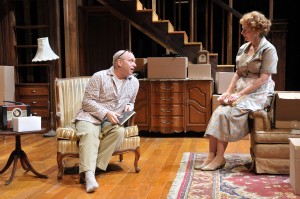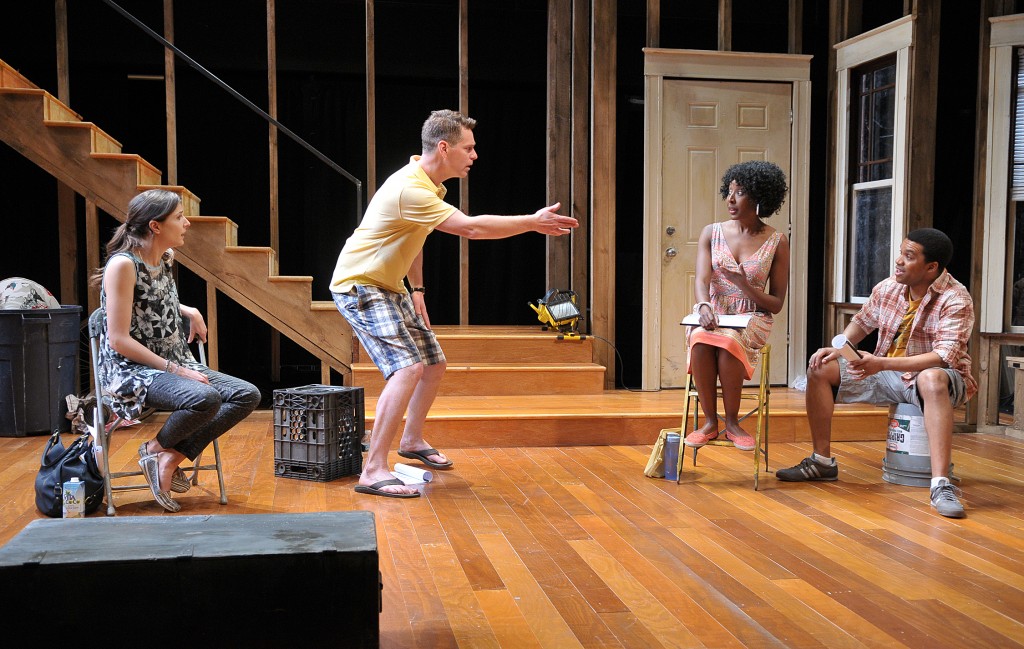Theater Review: “Clybourne Park” — Chafing at the Raw Wound of Racism
In Bruce Norris’ Pulitzer prize-winning play Clybourne Park, resentment and racism chafe at the thin veneer of polite pleasantries.
Clybourne Park by Bruce Norris. Directed by M. Bevin O’Gara. Staged by SpeakEasy Stage Company. At the Calderwood Pavilion in the Boston Center for the Arts, Boston, MA, through March 30.

Thomas Derrah and Paula Plum play a 1950s couple who face opposition from their neighbors in the SpeakEasy Stage Company production of CLYBOURNE PARK. Photo: Craig Bailey/Perspective Photo.
By Terry Byrne
Early on in Clybourne Park, Bev, a white homeowner tries to unload a silver chafing dish on her black maid Francine. Bev’s increasing insistence and Francine’s equally determined rejection set the tone for the entire play: resentment and racism chafe at the thin veneer of polite pleasantries.
What makes Bruce Norris’s Pulitzer Prize-winning play so compelling is his fascination with the way these characters chafe at each other and their fierce and often funny reaction to the raw wound of racism he exposes. Under the sure hand of director M. Bevin O’Gara, the SpeakEasy Stage Company production captures Norris’s tone as well as his careful pace, which begins leisurely and then builds to a crescendo of insults and recriminations, with devastating effect.
Clybourne Park refers to a neighborhood outside Chicago but is all about one house. This particular house, however, was the focus of the Younger family’s aspirations in Lorraine Hansbury’s classic drama A Raisin in the Sun. Norris takes that nugget and one of her characters then sets the action inside the house in 1959 for Act I, returning to the house in 2009 for Act II, positing that little has changed in our attitudes toward race.
As Act I opens, it’s been more than two years since homeowners Bev (Paula Plum, in a sublimely underplayed performance) and Russ (Thomas Derrah) endured the loss of their son, and they are eager to start over somewhere that doesn’t hold so many memories. While Francine (a luminous Marvelyn McFarlane) finishes packing their belongings and prepares to go home, Russ and Bev chat idly about geography and the tasks left before their move. The arrival of the local minister (Tim Spears) followed by an interfering neighbor (Michael Kaye), quickly exposes Russ’s heartbreak and fury toward his neighbors and the racism that drives everyone’s actions.
Act II opens with the same sort of idle chatter about world capitals, but it only takes a few minutes before the conversation devolves into insults and recriminations. While Act I’s drama centered on preventing a black family from moving into the neighborhood, in Act II, the neighbors are protesting sale because of the new, white owners’ plans to raze the house and gentrify the neighborhood.
The same actors play different roles in each act, and what makes this choice so poignant is that the arguments they make are almost word-for-word repetitions of the arguments they made 50 years earlier. Norris deliberately created characters who do not elicit any sympathy from the audience, although Derrah’s performance as Russ offers insight into a man whose emotional devastation leads understandably to loneliness and bitterness. While Norris leans on stereotypes, with the black characters in particular barely moving beyond cardboard, this doubling reinforces Norris’s disturbing idea that little has changed in our conversations about race.

Philana Mia, Michael Kaye, Marvelyn McFarlane, and DeLance Minifee in a scene from the SpeakEasy Stage Company production of CLYBOURNE PARK. Craig Bailey/Perspective Photo.
Norris also packs his play with none-too-subtle bits of symbolism—a deaf wife in the first act is the only person in the room attempting to listen to what people are saying and a symbol of everyone’s inability to hear anyone else’s perspective; a foot locker with a tragic note is buried in the first act and dug up in the second—but the goal is always to reinforce his theme of ongoing intolerance.
Director M. Bevin O’Gara is mindful of the play’s rhythms and guides her ensemble gracefully through the verbal minefield, which includes well-worn clichés, off-color jokes, and words that are wielded with vicious precision.
Cristina Todesco’s set feels bare and lifeless, a fitting frame for characters unable to connect with anyone outside the narrowly defined parameters of their world and sometimes not even there. Yet in this case the drama of non-communication has considerable diagnostic value. In Clybourne Park, Norris manages to craft an eloquent statement on race relations that encourages reflection on cycles of prejudice without serving up any trite solutions.
Fuse Editor/Theater Critic Bill Marx’s review of the 2011 New England premiere of Clybourne Park at Trinity Repertory Company in Providence, Rhode Island.
